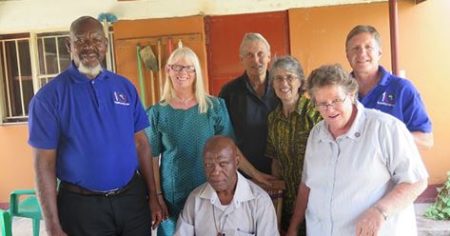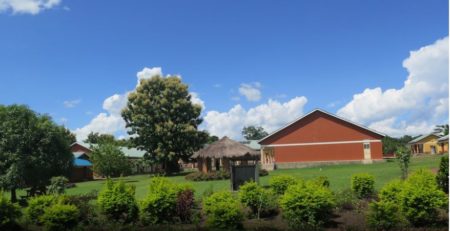This article was first published in Mercy E-News on 16th October, 2019
One of the first questions asked when a baby is born is ‘What is his name?’ ‘What is her name?’ Since arriving in South Sudan in July 2015 I have met people with exceptionally memorable names such as Genesis, Goodluck, Blessing, Rejoice, Hosanna, Repent and Ephesian. I have even met a young seminarian from the Nuba Mountain region of Sudan, called Mission! How must it feel for a baptised Catholic to introduce himself as ‘Mission’, to hear himself addressed as ‘Mission’, to sign himself ‘Mission’?
 Some members of the Yambio Community. Ailish O’Brien rsm is second from left in back row
Some members of the Yambio Community. Ailish O’Brien rsm is second from left in back row
Coincidentally, I am reminded very much of ‘Mission’ as the month of October arrives and we reflect on the message of Pope Francis for World Mission Day, 2019. In his message, Pope Francis says, “This missionary mandate touches us personally: I am a mission, always; you are a mission, always; every baptized man and woman is a mission.” So it is not just the Sudanese seminarian who is privileged to journey throughout the whole of his life with the name of ‘Mission’. All of us baptised Christians are mandated to be ‘Mission’…
My call to go on mission outside of my home country came in March 2014. With one year left to serve as Communications Coordinator for the Congregation of the Sisters of Mercy, I found myself at somewhat of a crossroads. As joining a religious congregation had been for me an
offering of myself to God for whatever He wanted me to do, at this juncture I had no idea where He would lead me to. In fact, I had begun to feel a little anxious as one does when the security of the known might suddenly become the unknown. In a moment of insight one evening while praying in the silence of our community chapel, I asked God the simple question, “What do You want me to do next?” Three days later, the answer to my question came in the form of an email sent by our Congregational Leader to all members of the Congregation. This email was a request for volunteers to work in South Sudan with the organisation ‘Solidarity with South Sudan’. As soon as I read that email, I knew I had to respond.
In his message for World Mission Day 2019 Pope Francis says, “Today too, the Church needs men and women who, by virtue of their baptism, respond generously to the call to leave behind home, family, country, language and local Church, and to be sent forth to the nations, to a world not yet transformed by the sacraments of Jesus Christ and his holy Church.” At first glance, one might think that Pope Francis was referring to men and women religious and urging them to ‘be sent forth to the nations’. But on closer examination we notice that he is addressing all men and women in the Church who are baptised. Furthermore, he is asking that there be a twofold involvement – firstly that these men and women respond and secondly that they be sent forth, presumably by their local Church. Pope Francis quite specifically mentions leaving behind one’s country and one’s language. Leaving behind one’s language is a big request and it is significant. It renders you somewhat helpless, dependent and reliant on the providence of God, and that is what we need most when we are away from home, family, country and familiar language.
Dr. Marshal Olal Johnson, in an address to the Solidarity with South Sudan Annual Assembly in July 2019, commented that South Sudan is an incredibly diverse country, with sixty-four different ethnic groups, each with its own language and culture. He maintains that the common purpose of opposition to colonial powers and the fight for independence from Sudan united these ethnic groups until Independence in 2011. According to Johnson, “the issue of national identity and unity within South Sudanese diverse ethnic groups was not properly addressed and they resurfaced in the state-building process after Independence was achieved. Ethnic conflict erupted in 2013 and violence is ongoing today”.
This is the context within which I carry out my ministry with the organisation ‘Solidarity with South Sudan’ – an organisation of two hundred religious congregations which came about as a response to a request by the Catholic Bishops of South Sudan, for training in education, health care, agriculture and pastoral ministry. These religious congregations support ‘Solidarity with South Sudan’ both financially and with personnel on the ground.
 Solidarity Teacher Training College, Yambio, South Sudan
Solidarity Teacher Training College, Yambio, South Sudan
I live in a mixed, inter-congregational, intercultural community of religious and lay persons. We all tutor in a teacher training college for primary school teachers in a town called Yambio, and, by the very nature of our community life, witness to the real possibility that people from diverse cultures and nationalities can and do live together in peace.
Our teacher trainees come from all over South Sudan and some from Sudan. Their programme of study follows the University of Juba Curriculum for Primary Teacher Training and our certificates are ratified by Juba University and signed by the Education Ministry in Juba (Juba is the capital city of South Sudan).
Of necessity, all our students are residential in the college due to a variety of factors – the vast distance from their homes and the fact that many of them come from camps for internally displaced people are but two. Even those from areas close to the college choose to live-in to avail of the study facilities such as library and light, accommodation and food security that residents of the college enjoy. They follow academic courses and parallel education courses and undergo two month-long periods of teaching practice in the surrounding primary schools.
I enjoy this ministry and find it fulfilling. The sense of ‘togetherness in mission’ is high among the community members and the feeling of having being ‘called’ here by God sustains us during the hard times. We pray Morning and Evening Prayer of the Church together in our beautiful college chapel and attend daily Mass in a nearby junior seminary. Our students also begin each day with Assembly and Morning Prayers – we are all tremendously aware of our dependence on God’s Providence.
Being always in need of more volunteers to serve in this vineyard is a perpetual state – anyone who is interested in volunteering can contact the Executive Director of Solidarity with South Sudan, Fr. Jim Greene MAfr at sssjuba@gmail.com
Ailish O’Brien rsm
South Sudan


